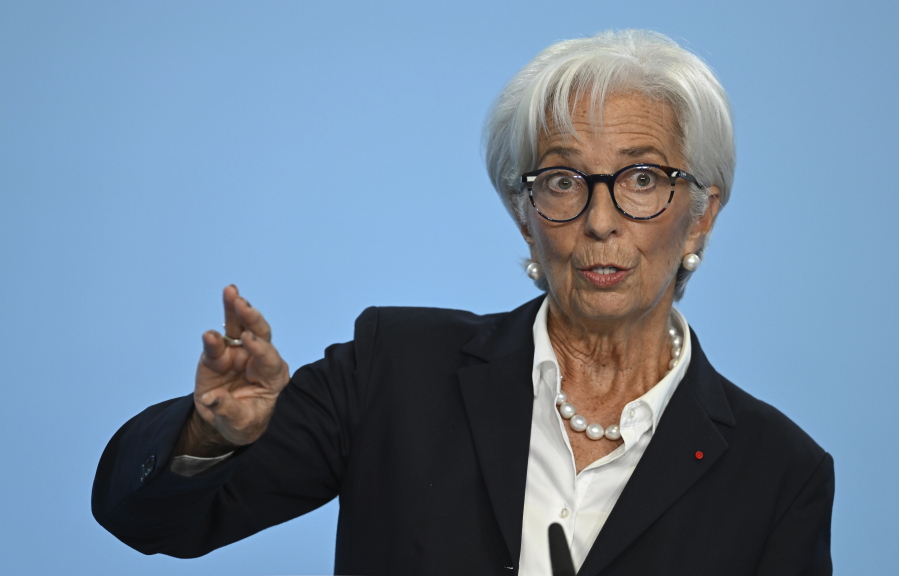FRANKFURT, Germany — The European Central Bank piled on another outsized interest rate hike aimed at squelching out-of-control inflation, increasing rates Thursday at the fastest pace in the euro currency’s history and raising questions about how far the bank intends to go with the threat of recession looming over the economy.
The 25-member governing council raised its interest rate benchmarks by three-quarters of a percentage point at a meeting in Frankfurt, matching its record increase from last month and joining the U.S. Federal Reserve in making a series of rapid hikes to tackle soaring consumer prices.
ECB President Christine Lagarde acknowledged the risk is growing that the 19-country eurozone economy may plunge into recession but says “inflation remains far too high” and will stay high for an extended period, so the bank expects to keep hiking.
“We are not done yet. There is more ground to cover,” she told reporters, despite expectations the economy will weaken the rest of this year and beginning of next.
“In the present state of uncertainty, with the likelihood of recession looming much more on the horizon and the probability of it having increased, everyone has to do their job,” Lagarde said. “Our job is price stability. This is our primary mandate and we are riveted to that.”
Central banks around the world are rapidly raising interest rates that steer the cost of credit for businesses and consumers. Their goal is to halt galloping inflation fueled by high energy prices tied to Russia’s war in Ukraine, post-pandemic supply bottlenecks, and reviving demand for goods and services after COVID-19 restrictions eased. The Fed raised rates by three-quarters of a point for the third straight time last month.
Quarter-point increases have usually been the norm for central banks. But that was before inflation spiked to 9.9% in the eurozone, fueled by higher prices for natural gas and electricity after Russia cut off most of its gas supplies during the war in Ukraine.
“A long lasting war in Ukraine remains a significant risk,” Lagarde said. “Confidence could deteriorate further and supply side constraints could worsen again. Energy and food costs could also remain persistently higher than expected. A weakening world economy could be an additional drag on growth in the euro area.”
Inflation robs consumers of purchasing power, leading many economists to pencil in a recession for the end of this year and the beginning of next year in the 19 countries that use the euro as their currency. While inflation in the U.S. is near 40-year highs of 8.2%, fueled in part by stronger growth and more pandemic support spending than in Europe, the American economy grew in the third quarter after having shrunk in the first half of 2022.
The ECB has now raised rates by a full 2 percentage points in just three months, distance that took 18 months to cover during its last extended hiking phase in 2005-2007 and 17 months in 1999-2000.
Some analysts foresee a half-point increase at the ECB’s last rate-setting meeting of the year in December and think the bank may pause after that.
Higher rates can control inflation by making it more expensive to borrow, spend and invest, lowering demand for goods. But the concerted effort to raise rates has also raised concerns about their impact on economic growth and on markets for stocks and bonds. Years of low rates on conservative investments have pushed investors toward riskier holdings such as stocks, a process that is now going into reverse, while rising rates can lower the value of existing bond holdings.
The head of the International Monetary Fund, Kristalina Georgieva, has warned that tightening monetary policy “too much and too fast” raises the risk of prolonged recessions in many economies. The IMF forecasts that global economic growth will slow from 3.2% this year to 2.7% next year.
The ECB also must keep an eye on the euro’s sagging value against the U.S. dollar, although the ECB says it does not target any particular exchange rate. A weaker euro worsens inflation by raising the price of imported goods.
The euro dropped below parity with the dollar after the ECB decision before climbing back up, but it remains near its lowest levels in 20 years. The euro rose above $1 a day earlier after falling below the one-to-one exchange rate in August.
Reasons for that drop include higher U.S. interest rates that attract money into investments priced in dollars and, more broadly, the dwindling prospects for Europe’s economy. Europe is facing headwinds from the loss of cheap Russian natural gas and an economic slowdown in key trade partner China.
ECB rate hikes, other things being equal, could support the euro by lessening the interest rate gap with the U.S.
The ECB’s benchmark for short-term lending to banks now stands at 2%, a level last seen in March 2009.



